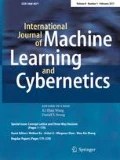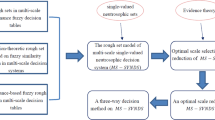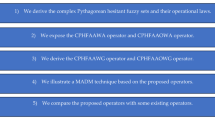Abstract
Multigranulation rough set over two universes provides a new perspective to combine multiple granulation knowledge in a multigranulation space in practical reality. Note that there are always non-essential neighborhood granulations, which would affect the efficiency and quality of decision making. Therefore, selecting valuable granulations and reducing worthless ones are necessary for the application of multigranulation rough set in decision process. In this paper, we first define several measurements to compare the granularity of neighborhood granulations, using which the granulation selection with multigranulation rough set is characterized. Then, the selection algorithms in the multigranulation space are developed. Third, we generate “OR” and “AND” decision rules based on multigranulation fusion strategies. As an application, these decision rules are employed to make decisions in the presence of disease diagnosis problems. In the end, the effectiveness and efficiency of the proposed algorithms are examined with numerical experiments on selective data sets.
Similar content being viewed by others
References
Ali MI, Davvaz B, Shabir M (2013) Some properties of generalized rough sets. Inf Sci 224:170–179
Chen DG, Yang YY, Dong Z (2016) An incremental algorithm for attribute reduction with variable precision rough sets. Appl Soft Comput 45:129–149
Chen DG, Yang YY, Wang H (2011) Granular computing based on fuzzy similarity relations. Soft Comput 15:1161–1172
Gong ZT, Sun BZ (2008) Probability rough sets model between different universes and its applications. Int Conf Mach Learn Cybern 1:561–565
Huang B, Guo CX, Zhuang YL, Li HX, Zhou XZ (2014) Intuitionistic fuzzy multigranulation rough sets. Inf Sci 277:299–320
Khan MA, Banerjee M, Rieke R (2014) An update logic for information systems. Int J Approx Reason 55:436–456
Khan MA (2016) Formal reasoning in preference-based multiple-source rough set model. Inf Sci 334–335:122–143
Kumar S, Inbarani H (2015) Optimistic multi-granulation rough set based classification for medical diagnosis. Proc Comput Sci 47:374–382
Mani A (2012) Dialectics of counting and the mathematics of vagueness, In: Peters JF, Skowron A (eds) Transactions on rough sets, vol 7255. Springer, Berlin, Heidelberg, pp 122–180
Mani A (2017) Generalized ideals and co-granular rough sets. In: Polkowski L et al (eds) Rough sets, vol 10314. Springer, Cham, pp 23–42
Ju HR, Yang XB, Song XN, Qi YS (2014) Dynamic updating multigranulation fuzzy rough set: approximations and reducts. Int J Mach Learn Cybern 5:981–990
Li JH, Mei CL, Xu WH, Qian YH (2015) Concept learning via granular computing: a cognitive viewpoint. Inf Sci 298:447–467
Liang JY, Wang F, Dang CY, Qian YH (2012) An efficient rough feature selsction algorithm with a multi-granulation view. Int J Approx Reason 53:1080–1093
Lin TY (1997) From rough sets and neighborhood systems to information granulation and computing in words. In: Proceeding Europe congress intelligent techniques and soft computing, September 8–12, pp 1602–1606
Lin GP, Liang JY, Qian YH (2013) Multigranulation rough sets: from partition to covering. Inf Sci 241:101–118
Lin GP, Liang JY, Qian YH (2014) Topological approach to multigranulation rough sets. Int J Mach Learn Cybern 5:233–243
Lin GP, Liang JY, Qian YH (2015) An information fusion approach by combining multigranulation rough sets and evidence theory. Inf Sci 314:184–199
Liu CH, Miao DQ, Zhang N (2012) Graded rough set model based on two universes and its properties. Knowl Based Syst 33:65–72
Liu CH, Miao DQ, Qian J (2014) On multi-granulation covering rough sets. Int J Approx Reason 55:1404–1418
Liu GL (2010) Rough set theory based on two universal sets and its applications. Knowl Based Syst 23:110–115
Liu X, Qian YH, Liang JY (2014) A rule-extraction framework under multigranulation rough sets. Int J Mach Learn Cybern 5:319–326
Ma WM, Sun BZ (2012) Probabilistic rough set over two universes and rough entropy. Int J Approx Reason 53:608–619
Pawlak Z (1982) Rough sets. Int J Comput Inf Sci 11:341–356
Pei DW, Xu ZB (2004) Rough set models on two universes. Int J Gen Syst 33:569–581
Qian YH, Liang JY, Pedrycz W, Dang CY (2010) Positive approximation: an accelerator for attribute reduction in rough set theory. Artif Intell 174:597–618
Qian YH, Liang JY, Yao YY, Dang CY (2010) Incomplete mutigranulation rough set. IEEE Trans Syst Man Cybern Part A 20:420–430
Qian YH, Liang JY, Yao YY, Dang CY (2010) MGRS: a multi-granulation rough set. Inf Sci 180:949–970
Qian YH, Li SY, Liang JY, Shi ZZ, Wang F (2014) Pessimistic rough set based decisions: a multigranulation fusion strategy. Inf Sci 264:196–210
Qian YH, Cheng HH, Wang JT, Liang JY, Pedrycz W, Dang CY (2017) Grouping granular structures in human granulation intelligence. Inf Sci 382–383:150–169
Rauszer C (1991) Rough logic for multi-agent systems. In: Masuch M, Polos L (eds) Logic at Work’92, vol 808. Springer, Berlin, Heidelberg, pp 151–181
Shen Y, Wang F (2011) Variable precision rough set model over two universes and its properties. Soft Comput 15:557–567
Skowron A, Rauszer C (1992) The discernibility matrices and functions in information systems. In: Slowiński R (ed) Intelligent decision support. Handbook of applications and advances of the rough sets theory. Kluwer, Dordrecht
Sun BZ, Ma WM (2015) Multigranulation rough set theory over two universes. J Intell Fuzzy Syst 28:1251–1269
Sun BZ, Ma WM (2015) An approach to consensus measurement of linguistic preference relations in multi-attribute group decision making and application. Omega 51:83–92
Sun BZ, Ma WM, Qian YH (2017) Multigranulation fuzzy rough set over two universes and its application to decision making. Knowl Based Syst 123:61–74
Tan AH, Wu W-Z, Li JJ, Lin GP (2016) Evidence-theory-based numerical characterization of multigranulation rough sets in incomplete information systems. Fuzzy Sets Syst 294:18–35
Tan AH, Wu W-Z, Tao YZ (2017) On the belief structures and reductions of multigranulation spaces with decisions. Int J Approx Reason 88:39–52
Wang GY, Yu H, Yang DC (2002) Decision table reduction based on conditional information entropy. Chin J Comput 25:759–766
Wong SK, Wang LS, Yao YY (1992) Interval structure: a framework for representing uncertain information. In: Proceeding of UAI92, pp 336–343
Wong SKM, Wang LS, Yao YY (1995) On modeling uncertainty with interval structures. Comput Intell 11:406–426
Wu WZ, Mi JS, Zhang WX (2003) Generalized fuzzy rough sets. Inf Sci 151:263–282
Xu WH, Wang QR, Zhang XT (2011) Multi-granulation fuzzy rough sets in a fuzzy tolerance approximation space. Int J Fuzzy Syst 13:246–259
Xu WH, Sun WX, Zhang XY, Zhang WX (2012) Multiple granulation rough set approach to ordered information systems. Int J Gen Syst 41:475–501
Xu WH, Li WT (2014) Granular computing approach to two-way learning based on formal concept analysis in fuzzy datasets. IEEE Trans Cybern 46:366–379
Xu WH, Li WT, Zhang XT (2017) Generalized multigranulation rough sets and optimal granularity selection. Granul Comput 2:271–288
Yang HL, Guo ZL (2015) Multigranulation decision-theoretic rough sets in incomplete information systems. Int J Mach Learn Cybern 6:1005–1018
Yang XB, Song XN, Dou HL (2011) Multi-granulation rough set: from crisp to fuzzy case. Ann Fuzzy Math Inform 1:55–70
Yang XB, Qi YS, Song XN, Yang JY (2013) Test cost sensitive multigranulation rough set: model and minimal cost selection. Inf Sci 250:184–199
Yao YY (1998) Relational interpretation of neighbourhood operators and rough set approximation operators. Inf Sci 111:239–259
Yao YY (2000) Granular computing: basic issues and possible solutions. In: Proceedings of fifth joint conference on information sciences, vol I, Atlantic City, New Jersey, USA, pp 186–189
Yao YY, Yao BX (2012) Covering based rough set approximations. Inf Sci 200:91–107
Yao YY, She YH (2016) Rough set models in multigranulation spaces. Inf Sci 327:40–56
Zadeh LA (1997) Toward a theory of fuzzy information granulation and its centrality in human reasoning and fuzzy logic. Fuzzy Sets Syst 90:111–127
Zhang HY, Zhang WX, Wu WZ (2009) On characterization of generalized interval-valued fuzzy rough sets on two universes of discourse. Int J Approx Reason 51:56–70
Acknowledgements
This work is supported by the grants from National Natural Science Foundation of China (Nos. 61602415, 61573321, 41631179, 41701447 and 61773349), the Natural Science Foundation of Zhejiang Province of China (No. LY18F030017), and the New Talent Plan of Scientific and Technological Innovation Activity of College Students in Zhejiang (No. 2017R411036).
Author information
Authors and Affiliations
Corresponding author
Additional information
Publisher's Note
Springer Nature remains neutral with regard to jurisdictional claims in published maps and institutional affiliations.
Rights and permissions
About this article
Cite this article
Tan, A., Wu, WZ., Shi, S. et al. Granulation selection and decision making with multigranulation rough set over two universes. Int. J. Mach. Learn. & Cyber. 10, 2501–2513 (2019). https://doi.org/10.1007/s13042-018-0885-7
Received:
Accepted:
Published:
Issue Date:
DOI: https://doi.org/10.1007/s13042-018-0885-7




